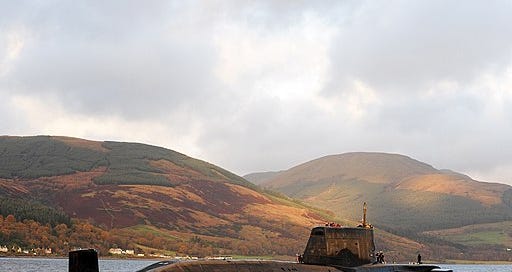There are many reasons to oppose Scottish independence. One often overlooked argument is that independence would leave Scotland defenceless, writes Roger Watson.
Royal Navy submarine HMS Astute sails up the Clyde estuary into Faslane.
The prospect of a second independence referendum in Scotland is no longer remote. The possibility of a Labour government in Westminster, propped up by the SNP that makes its support contingent on another referendum, is also eminently possible. Only through the good sense of 55.3% of the population did Scotland escape independence back in 2014. Enthusiasm for independence has waned since then, but arguments against independence are worth reiterating. One often overlooked issue is that an independent Scotland would be unable to defend itself.
Scotland receives aid via that Flying Scotsman of a gravy train, the Barnett formula. At £32 billion for a population of five and a half million, is in the same region as the approximately £40 billion that the world sends to the whole of the African continent with a population three orders of magnitude greater. Income from the Barnett formula is nearly double the £17.7 billion Scotland earns from oil, whisky and tourism combined. Oil revenues are already plummeting, possibly to zero in the wake of eco-maniac policies geared as they are in Scotland towards wind and solar power. Solar power seems an unlikely prospect in Scotland. There may be wind in abundance, but surely, they are missing a permanent source of energy in the form of the hot air generated by the SNP.
Scotland’s total GDP is £166 billion. This compares with £1.9 trillion in England. This means that if Scotland loses the Barnett formula it will become a third world country. Furthermore, it has no currency of its own with the Westminster government making it clear, in the event of a vote for independence, it will no longer be able to use the pound.





